Introduction to Local Economies
Local economies refer to the economic systems that are centered around a specific geographic area, primarily focusing on the businesses and services operated within that community. These economies thrive on the interactions and transactions between local producers, consumers, and institutions, creating a unique sense of culture and identity that reflects the community’s values and traditions. Supporting local economies while traveling is crucial; it not only fosters economic sustainability but also enriches the travel experience itself.

When travelers choose to patronize local businesses, such as artisans crafting handmade goods, independently owned restaurants showcasing regional cuisine, or vibrant markets filled with local produce, they contribute directly to the livelihood of community members. This process empowers the local populace by maintaining jobs and creating new opportunities, which can ultimately lead to healthier and more resilient communities. It is important for tourists to recognize that their choices have significant repercussions, impacting both the local economy and the authenticity of the travel experience.
Travelers who engage with local economies often find themselves immersed in rich cultural exchanges, gaining insights into various customs and traditions that might not be evident in larger, commercial establishments. Furthermore, supporting local businesses tends to result in a more sustainable travel environment, reducing the carbon footprint associated with transporting goods over long distances. This approach not only champions the local economy but also encourages responsible tourism practices that prioritize environmental stewardship and cultural preservation.
By making conscious decisions to engage with local economies while traveling, tourists not only enhance their own experiences but also contribute to creating a more balanced and equitable global economy. This underscores the importance of understanding the role that local businesses play in shaping the socioeconomic landscape of their regions, ultimately highlighting the interconnectedness of travel and community support.
Economic Development through Travel
Traveling is not only an avenue for personal enjoyment but also plays a pivotal role in enhancing local economies. When tourists spend money on local attractions, dining establishments, and accommodations, this generates revenue that can significantly stimulate economic growth. This phenomenon is known as the multiplier effect, as every dollar spent by tourists circulates within the community, potentially creating additional income and employment opportunities for residents.

For instance, tourism-related expenditures can lead to job creation in various sectors. Local businesses, such as restaurants, shops, and service providers, often require additional staff to meet the increased demand resulting from tourist visits. This creates direct employment opportunities for the local population, thereby enhancing their financial stability. Moreover, these local enterprises frequently purchase goods and services from other businesses within the community, further promoting economic interdependence and fostering a vibrant local economy.
Statistics illustrate the impact of tourism on local economic development. According to the World Tourism Organization, international tourist arrivals reached 1.5 billion in 2019, generating approximately $1.5 trillion in global revenue. A significant portion of this income supports local businesses, leading to various benefits, including increased investment in public infrastructure and enhanced community services. Case studies, such as those from towns heavily reliant on eco-tourism, reveal that the influx of visitors can fund essential services like education and healthcare while preserving cultural heritage and natural resources.
In summary, supporting local businesses while traveling serves as a catalyst for economic development. By choosing to spend money on local enterprises, travelers not only enjoy unique experiences but also contribute to the livelihoods of residents, thereby strengthening the economic fabric of the communities they visit. As it stands, the collective effort of tourists in nurturing local economies ultimately promotes sustainable development and greater resilience against economic fluctuations.
Preserving Cultural Heritage
Traveling to new destinations provides individuals with the unique opportunity to immerse themselves in different cultures. Supporting local economies during these travels plays a crucial role in the preservation of cultural heritage. By engaging with local artisans and traditional businesses, travelers contribute to the maintenance of age-old practices, crafts, and cuisines that define a community’s identity. Such contributions are pivotal in ensuring that these cultural expressions do not fade away in the wake of globalization.
Local artisans often produce hand-crafted goods that reflect centuries of tradition and skill. Each piece carries with it stories and techniques passed down through generations, forming an integral part of the locality’s cultural tapestry. When visitors choose to purchase handmade crafts, they not only acquire unique souvenirs but also provide financial support directly to the craftsmen, helping them sustain their art. This support is vital for communities where traditional practices might struggle to compete with mass-produced goods. The survival of these arts enriches the cultural landscape of the area and allows for a more authentic travel experience.
Moreover, engaging with local cuisines further enhances cultural immersion. Travelers who dine in family-owned restaurants are likely to enjoy authentic dishes that embody the flavors and traditions of the region. This connection to local culinary practices promotes the continuation of traditional recipes and cooking methods, which might otherwise be lost. Authenticity in travel experiences stems from these interactions, as they allow visitors to witness and appreciate the living culture rather than mere replicas created for tourist consumption. By fostering genuine connections with local heritage, travelers can facilitate a symbiotic relationship that benefits both the visitor and the host community.

Benefits of Supporting Local Artisans
When travelers make the conscious decision to support local artisans, they are engaging in a practice that extends beyond mere transactions. Purchasing handmade or locally crafted goods contributes significantly to the sustainability of communities and serves as a testament to the rich cultural heritage of a region. Each piece, whether it be pottery, textiles, or jewelry, carries a unique story that reflects the artisan’s skills, traditions, and creative expression.
Artisans typically possess specialized skills that have been passed down through generations. Their craftsmanship is not just a hobby; it is a way of life steeped in history and culture. This level of skill often results in products that are not only aesthetically pleasing but also durable and functional. Unlike mass-produced items, which may lack character, locally made goods offer authenticity that can resonate deeply with buyers. By investing in such artistry, travelers become part of a larger narrative, fostering a sense of connection to the community.
Moreover, supporting local artisans can play a pivotal role in preserving traditional crafts and techniques that may otherwise face extinction due to globalization and industrialization. As artisans find financial stability through the sale of their goods, they are more likely to continue their craft and pass it down to future generations. This preservation of artistry not only enriches the cultural landscape for future travelers but also helps maintain the unique identity of a community.
Furthermore, investing in local businesses promotes economic growth within the community. As artisans receive fair compensation for their work, they reinvest in their local economy, creating additional job opportunities and invigorating the cultural scene. Thus, every purchase made directly contributes to the livelihood of artisans and the overall development of their cultural ecosystem.
The Role of Local Restaurants in Travel
When traveling, one significant way to support local economies is by dining at local restaurants. This practice allows travelers to engage with the culture of the region through its cuisine, fostering a deeper understanding of the local traditions and flavors. Eating at a local establishment provides not only a meal but an experience that reflects the rich history and culinary heritage of the area. Travelers benefit from enjoying authentic dishes prepared with regional ingredients, often unavailable in standard chain restaurants.

Culinary tourism has emerged as a vital part of the travel industry, where food lovers seek out destinations renowned for their unique gastronomic offerings. This trend has a positive impact on local economies, as it encourages visitors to spend money at various small businesses, including restaurants, markets, and farms. Local restaurants often rely on community support and play a pivotal role in job creation within the area. By choosing to dine at local eateries, travelers help sustain jobs for chefs, servers, and other staff members, promoting economic growth and stability.
Moreover, many of these local restaurants prioritize sourcing ingredients from nearby farmers and suppliers, which strengthens the agricultural economy. By supporting local sourcing, restaurants reduce transportation costs, lower their carbon footprint, and offer diners fresher, more flavorful ingredients. Insights from local chefs illustrate the passion and creativity involved in utilizing regional produce, which often translates into unique dishes and innovative culinary experiences. This practice also fosters a sense of community, establishing connections between consumers and producers, ultimately resulting in a more resilient local economy.
In conclusion, dining at local restaurants while traveling not only enhances the experience through authentic culinary exploration but also supports the economic framework of the community. Engaging with local cuisine is an essential step in responsible travel, reinforcing the vital role that these establishments play in sustaining local economies.
Sustainable Travel Practices
In recent years, sustainable travel practices have emerged as an essential aspect of responsible tourism. Supporting local economies while traveling is a key component of this framework, as it encourages visitors to actively engage with the communities they visit. One effective way to achieve this is by prioritizing sustainable spending. Travelers can contribute to local economies by purchasing goods and services from local artisans, farmers, and businesses rather than international chains. This not only fosters economic growth within the community but also helps preserve the unique cultural identity of the destination.
Another significant aspect of sustainable travel involves choosing eco-friendly accommodations. Opting for lodgings that prioritize environmental responsibility demonstrates a commitment to minimizing the footprint of travel. Many local hotels and guesthouses implement green practices, such as utilizing renewable energy sources, reducing water consumption, and promoting waste reduction. By selecting these establishments, travelers directly support the local economy and contribute to environmental conservation efforts. Furthermore, these eco-friendly options often provide more authentic experiences, allowing visitors to connect with the region’s culture.
Minimizing the environmental impact of travel is also vital for sustainable tourism. Travelers can achieve this by employing various strategies, such as using public transportation, cycling, or walking to explore destinations. These alternatives not only reduce carbon emissions but also offer a more immersive experience in the local environment. Additionally, being mindful of wildlife and natural habitats is crucial while traveling. Maintaining a respectful distance and adhering to guidelines set by local conservationists ensures that the natural beauty of the area remains preserved for future generations.
By practicing sustainable travel, individuals help create long-term benefits for the destinations they visit. Not only does responsible tourism foster economic growth, but it also encourages the preservation of local cultures and environments. Thus, travelers play a vital role in shaping a sustainable future for global tourism.
Challenges Faced by Local Businesses
Local businesses operate within a unique ecosystem when situated in tourist areas, often facing a series of significant challenges that threaten their sustainability and growth. One of the most pressing issues is over-tourism, which can lead to a dilution of the local culture and a strain on resources. As the influx of tourists increases, local businesses may find themselves overwhelmed, struggling to meet both the demands of visitors and the needs of the community. This imbalance can result in higher prices for goods and services, ultimately making it difficult for local establishments to compete with larger, more affordable international brands.
Competition with these global entities further exacerbates the challenges faced by local businesses. International brands often benefit from economies of scale, allowing them to offer lower prices than smaller, independently-owned businesses. This competitive disadvantage may cause local enterprises to suffer from reduced customer footfall, as tourists frequently gravitate towards the familiarity of well-known brands rather than exploring local options. Consequently, the vibrant and authentic experiences that local businesses provide risk being overshadowed by generic offerings.
Additionally, economic pressures such as rising rent and operational costs compound the difficulties encountered by local businesses. In many tourist-heavy regions, property owners may prioritize short-term rental agreements over long-term leases, leading to increased costs for those establishments trying to maintain their presence. This economic landscape creates an environment where small businesses struggle to thrive, often leading to closures and a loss of unique cultural offerings.
Conscious consumerism plays a vital role in bridging these gaps and ensuring that local businesses can not only survive but thrive. By opting to support independent enterprises, travelers contribute to the vitality of local economies while preserving the unique cultural tapestry that makes each destination special. Ultimately, making informed choices enhances both the travel experience and the well-being of the community.
Tips for Supporting Local Economies While Traveling
Traveling presents a unique opportunity to immerse oneself in diverse cultures while simultaneously contributing to local economies. By adopting mindful practices during your travels, you can make a meaningful impact on the communities you visit.
One effective way to support local economies is by choosing to stay in locally-owned accommodations. Instead of large hotel chains, consider booking a room in a bed and breakfast, guesthouse, or vacation rental owned by residents. This not only provides a more authentic experience but also ensures that your spending benefits local families and businesses directly. Moreover, many local accommodations offer personalized insights into the area, enhancing your travel experience.
Eating at local restaurants is another significant way to support the economy. Dining at establishments that prioritize local ingredients not only allows travelers to indulge in authentic cuisine but also provides essential income to local farmers and artisans. Look for eateries that showcase regional dishes or have a farm-to-table concept to maximize the economic benefit to the area.
Shopping at local markets and craft shops can further enrich your travel experience. When you purchase handmade goods or fresh produce from local vendors, you not only create jobs but also foster the preservation of traditional crafts and culinary talents. This respect for local craftsmanship brings unique souvenirs back home rather than mass-produced items offered at tourist shops.
Engaging in local tours and activities can also enhance your connection to the community. Seek out tours led by local guides who can share insights into the culture and history of the area, creating a more meaningful travel experience. Whether it’s a hiking tour, culinary class, or cultural workshop, contributing to local tour companies helps ensure that more tourism revenue stays within the community.
By implementing these strategies, travelers can significantly impact local economies, promote sustainability, and create enduring connections with the places they visit. This commitment to supporting local businesses not only enhances the travel experience but also contributes to the long-term preservation of unique cultures and communities.
Conclusion: The Impact of Our Choices
As travelers, our choices have a profound impact on the destinations we visit, particularly concerning local economies. Supporting local businesses during our travels not only enhances our experience but also fosters economic growth and cultural preservation in the communities we explore. When we opt for locally-owned accommodations, eateries, and shops, we are directly contributing to the livelihoods of local families and entrepreneurs. This choice encourages a diversified economy that is less reliant on external funding and large corporations.
Furthermore, our spending habits can cultivate a positive feedback loop, where local enterprises thrive, leading to job creation and improved infrastructure. The resulting economic stability empowers communities to maintain their unique cultural identities, traditions, and heritage sites. As travelers, our support acts as a vote for what we value—authentic experiences and cultural diversity can be prioritized when we intentionally choose local over commercial. This nuanced engagement enables us to contribute meaningfully rather than merely being passive observers.
It is essential to recognize that supporting local economies can also enhance our travel experience. Interaction with local residents can provide deeper insights into their culture, history, and daily life, enriching our understanding and appreciation of the places we visit. Thoughtful spending fosters relationships and experiences that are often missing when travelers gravitate towards multinational chains and tourist traps.
In conclusion, being conscious of where we spend our money while traveling carries benefits that extend both to us and the communities we engage with. By making informed choices to support local economies, we help create sustainable growth and leave a positive impact long after we have departed. The cumulative effect of these mindful decisions reverberates across destinations, ensuring that both travelers and locals can flourish together.



